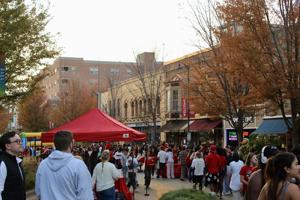 ISU’s Homecoming kickoff lights up Uptown CircleThe spirit of Illinois State University came alive Monday night as hundreds of students, alumni and community members gathered in Uptown Circle to celebrate the start of Homecoming week with the annual tree lighting and kick-off event. Beneath a crisp autumn sky, the crowd gathered in a sea of red as the lights flickered on, officially marking the beginning of a weeklong celebration that brings together generations of Redbirds. The sound of ISU’s Big Red Marching Machine filled the air, echoing through Uptown as attendees cheered. ISU President Aondover Tarhule described the evening as “absolutely exciting.” He said seeing alumni from past decades mingle with current students is what makes the event truly special. “One of the things I really like is meeting the alumni that come from the 60s or 70s, and they tell stories of how things were back then and the changes that they see,” Tarhule said. “It’s like the passing of the torch.” Tarhule added that the energy of the evening, and of Homecoming week overall, captures what makes ISU unique. “School is important; people come here to earn their degree,” Tarhule said. “But if you just came here to study, study, study and go nowhere, I think it would be pretty boring. It’s having activities like this, the enjoyment, the memories; this is what really stays in people’s minds. It’s what makes a college town a college town.” For ISU senior acting major Taniah Jones, the night was nothing short of “magical.” “Events like these are important because it lets people have fun, it gives people something to do,” Jones said. “There’s a lot of cool, free stuff and it’s cute in Uptown, so that’s a plus.” For many students, Homecoming is about more than just football; it’s about connection. Senior mass media major Aliah Mendoza said she looks forward to the unity the week brings every year. “My favorite part of Homecoming week, really, is the school spirit,” Mendoza said. “Regardless of where you go, everyone's super excited. Everyone's just wearing ISU gear, and of course, tailgating, probably the most. I’m excited for it.” That sense of community is what keeps students like seniors America Vallejo and Diana Solano coming back year after year. “We always go to the Homecoming games,” Solano said. “No matter if we win or lose, we always go and get dinner with friends afterwards.” For the Executive Director of Alumni Engagement, Kristin Harding, the event embodied what Homecoming is meant to be. “Whether it’s for current students or alums, it’s the feeling you get coming back to the institution,” Harding said. “We hope that this instilled a sense of tradition, a sense of celebration and a sense of spirit so that when students graduate, they remember what it was like to be at Illinois State during Homecoming week.” Harding described the night in one word: “spirit.” “Illinois State is highly relational. We’re very committed to the success of our students,” Harding said. “This helps raise that spirit of tradition. People are here to celebrate the great things that Illinois State has accomplished.” As the crowd slowly dispersed into the Uptown streets, the glowing red lights of the trees lingered, a symbol of Redbird pride burning bright. The Homecoming festivities will continue throughout the week, leading up to Saturday’s parade and football game, but for many, the heart of the celebration began right here, under the lights in Uptown Circle.
ISU’s Homecoming kickoff lights up Uptown CircleThe spirit of Illinois State University came alive Monday night as hundreds of students, alumni and community members gathered in Uptown Circle to celebrate the start of Homecoming week with the annual tree lighting and kick-off event. Beneath a crisp autumn sky, the crowd gathered in a sea of red as the lights flickered on, officially marking the beginning of a weeklong celebration that brings together generations of Redbirds. The sound of ISU’s Big Red Marching Machine filled the air, echoing through Uptown as attendees cheered. ISU President Aondover Tarhule described the evening as “absolutely exciting.” He said seeing alumni from past decades mingle with current students is what makes the event truly special. “One of the things I really like is meeting the alumni that come from the 60s or 70s, and they tell stories of how things were back then and the changes that they see,” Tarhule said. “It’s like the passing of the torch.” Tarhule added that the energy of the evening, and of Homecoming week overall, captures what makes ISU unique. “School is important; people come here to earn their degree,” Tarhule said. “But if you just came here to study, study, study and go nowhere, I think it would be pretty boring. It’s having activities like this, the enjoyment, the memories; this is what really stays in people’s minds. It’s what makes a college town a college town.” For ISU senior acting major Taniah Jones, the night was nothing short of “magical.” “Events like these are important because it lets people have fun, it gives people something to do,” Jones said. “There’s a lot of cool, free stuff and it’s cute in Uptown, so that’s a plus.” For many students, Homecoming is about more than just football; it’s about connection. Senior mass media major Aliah Mendoza said she looks forward to the unity the week brings every year. “My favorite part of Homecoming week, really, is the school spirit,” Mendoza said. “Regardless of where you go, everyone's super excited. Everyone's just wearing ISU gear, and of course, tailgating, probably the most. I’m excited for it.” That sense of community is what keeps students like seniors America Vallejo and Diana Solano coming back year after year. “We always go to the Homecoming games,” Solano said. “No matter if we win or lose, we always go and get dinner with friends afterwards.” For the Executive Director of Alumni Engagement, Kristin Harding, the event embodied what Homecoming is meant to be. “Whether it’s for current students or alums, it’s the feeling you get coming back to the institution,” Harding said. “We hope that this instilled a sense of tradition, a sense of celebration and a sense of spirit so that when students graduate, they remember what it was like to be at Illinois State during Homecoming week.” Harding described the night in one word: “spirit.” “Illinois State is highly relational. We’re very committed to the success of our students,” Harding said. “This helps raise that spirit of tradition. People are here to celebrate the great things that Illinois State has accomplished.” As the crowd slowly dispersed into the Uptown streets, the glowing red lights of the trees lingered, a symbol of Redbird pride burning bright. The Homecoming festivities will continue throughout the week, leading up to Saturday’s parade and football game, but for many, the heart of the celebration began right here, under the lights in Uptown Circle.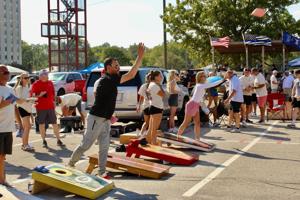 Students and families react to new ISU tailgate policy limiting lot hoursWith Illinois State University’s new tailgate policy in full effect, mixed reactions sparked among students and families. While some fans agreed with the intent, others claimed it cut into a long-standing Redbird tradition. Senior journalism major Ally Cooper saw both sides of the decision. “I think a lot of people like to tailgate during the game and just continue playing outdoor games, or watch TV, or hang out with family and don’t actually buy tickets to the game,” Cooper said. “I think this policy will force them to buy tickets and carry their party over to actually watch the Redbirds play, which I think is a good thing,” Cooper continued. Despite the intentions of the adjustments, she said the policy changes the social atmosphere. “I’m kind of happy and unhappy with it,” Cooper said. “The friends and family aspect of the games is fun too, but it’s also an overarching goal of supporting the Redbirds.” For some families, the shortened hours make the trip to Normal less worthwhile. Chris Mikkelsen, a parent of an ISU student, said the new policy felt restrictive for those who travel to campus for game day. “As a parent of an ISU student who drives up here for these events, it’s a little disheartening to make the drive and commitment to come up here and only be able to tailgate for two or three hours,” Mikkelsen said. “I’ve been to tailgates at other schools, and they tend to go longer into the evening.” Mikkelsen hopes the university reconsiders. “I think they should at least go to halftime,” Mikkelson said. “Give the families and alumni the opportunity to go for another couple of hours.” Other students like Cameron Collins, a sophomore advanced marketing analytics major, said they understood the safety concerns but believed there is room for compromise. “I don’t see much of a problem with the new policy,” Collins said. “I just think there’s a lot of people who’d like to stay and see the game, maybe into the first quarter.” Collins said the policy’s intent is valid. “I believe this policy helps with safety,” Collins said. “But at the same time, I think there’s definitely ways to manage it while also extending the time.” Others were more critical of the change. Senior business major Carson Houser said the policy takes away from what makes ISU game days enjoyable. “It’s shortening my tailgate experience by a lot,” Houser said. “Last year, we used to tailgate for the full game, and that was way more fun than having to stop before we go inside.” As ISU fans gathered for the game against North Dakota State University, reactions remained split. For some, the policy represents a shift toward safety and school spirit. For others, it may be the end of a Redbird tradition.
Students and families react to new ISU tailgate policy limiting lot hoursWith Illinois State University’s new tailgate policy in full effect, mixed reactions sparked among students and families. While some fans agreed with the intent, others claimed it cut into a long-standing Redbird tradition. Senior journalism major Ally Cooper saw both sides of the decision. “I think a lot of people like to tailgate during the game and just continue playing outdoor games, or watch TV, or hang out with family and don’t actually buy tickets to the game,” Cooper said. “I think this policy will force them to buy tickets and carry their party over to actually watch the Redbirds play, which I think is a good thing,” Cooper continued. Despite the intentions of the adjustments, she said the policy changes the social atmosphere. “I’m kind of happy and unhappy with it,” Cooper said. “The friends and family aspect of the games is fun too, but it’s also an overarching goal of supporting the Redbirds.” For some families, the shortened hours make the trip to Normal less worthwhile. Chris Mikkelsen, a parent of an ISU student, said the new policy felt restrictive for those who travel to campus for game day. “As a parent of an ISU student who drives up here for these events, it’s a little disheartening to make the drive and commitment to come up here and only be able to tailgate for two or three hours,” Mikkelsen said. “I’ve been to tailgates at other schools, and they tend to go longer into the evening.” Mikkelsen hopes the university reconsiders. “I think they should at least go to halftime,” Mikkelson said. “Give the families and alumni the opportunity to go for another couple of hours.” Other students like Cameron Collins, a sophomore advanced marketing analytics major, said they understood the safety concerns but believed there is room for compromise. “I don’t see much of a problem with the new policy,” Collins said. “I just think there’s a lot of people who’d like to stay and see the game, maybe into the first quarter.” Collins said the policy’s intent is valid. “I believe this policy helps with safety,” Collins said. “But at the same time, I think there’s definitely ways to manage it while also extending the time.” Others were more critical of the change. Senior business major Carson Houser said the policy takes away from what makes ISU game days enjoyable. “It’s shortening my tailgate experience by a lot,” Houser said. “Last year, we used to tailgate for the full game, and that was way more fun than having to stop before we go inside.” As ISU fans gathered for the game against North Dakota State University, reactions remained split. For some, the policy represents a shift toward safety and school spirit. For others, it may be the end of a Redbird tradition.
- Illinois State launches AI research to detect early signs of atrial fibrillationIllinois State University has launched a new Partnership for AI Research (PAIR) project to aid in medical research. Clinical nurse specialist, researcher and Carle BroMenn Medical Center endowed professor in the Mennonite College of Nursing, Marilyn Prasun and assistant professor in the School of Information Technology, Nariman Ammar, collaborated on this project, which aims to detect early signs of Atrial Fibrillation using AI and machine learning technology. Atrial Fibrillation is a cardiovascular condition in which the two upper chambers of your heart don’t contract regularly, and can lead to blood pooling, which increases your risk of stroke. Prasun said that collaboration is a big part of this project. “I think that collaboration is really the exciting part about this study because we’re taking two different disciplines and coming together to really seek to answer questions,” Prasun said. “To my knowledge, I believe this is the first time that the College of Nursing and Dr. Ammar’s area, computer science and technology, have joined together to really seek to answer questions.” Ammar also talked about collaboration and what PAIR is currently focusing on. “This is definitely the first time the School of IT collaborated with the College of Nursing at that level. We are building a research lab for using AI to solve health-related research problems, and so that can be a nice place for all faculty and students, and it will attract more talents for sure,” Ammar said. “We are focusing on cardiovascular for now, so any health condition that can fall under that umbrella will be solved with those AI methodologies, and so it is bigger than just one research study.” Prasun talked about PAIR’s mission, which is currently to use AI and machine technology to detect early signs of Atrial Fibrillation. “Our hope, as Dr. Ammar stated, was to develop this interdisciplinary team skilled at applying machine learning and AI technology to assist in identifying health issues, and for this study in particular, we’re really looking at algorithms to help facilitate the early detection of Atrial Fibrillation,” Prasun said. “The goal is can we find these individuals early and predict the potential occurrence of Atrial Fibrillation, which potentially could lead to people being treated earlier and ultimately having better outcomes.” Prasun and Ammar also talked about how PAIR came to be. “This has been a fun and exciting journey in that Dr. Ammar reached out. Although we’re colleagues working at the same university, we really didn’t know one another prior to this, but she’d seen an opportunity,” Prasun said. “I saw this as an opportunity which was unique. I actually wanted to help institutions who do not yet have this idea for a research lab that would apply AI to healthcare, so they offered us funding to establish the lab in terms capacity building, so basically training faculty and students to be able to use AI in an ethical way, so unbiased, privacy preserving and to be able to do research,” said Ammar. “It’s not just using AI in the traditional way, it’s also respecting diversity in the data and these kinds of things, which are essential for healthcare. It’s also a good opportunity for ISU in general.” Ammar then went on to discuss future plans for PAIR. “There’s a phase two, and we’re hoping we’re gonna get it. We’re applying for bigger grant opportunities within NIH (National Institutions of Health) and other places as well,” Ammar said.

- Town of Normal is presented with the Bird City designationThe Town of Normal was awarded its Bird City Illinois designation in recognition of the town’s commitment to nature and birds. In an article posted by the Town of Normal, Mayor Chris Koos emphasized the importance of environmental sustainability to the Town of Normal. “The Town's founder, Jesse Fell, was a great believer in beautiful green spaces and planted thousands of street trees in his lifetime, some of which still stand today,” Koos said. “The Town is committed to environmental sustainability. Part of that means ensuring native habitats and environments exist in our community for pollinators and birds.” Being one of 11 towns considered a Bird City, Normal has many contributions that lead to the official designation. This includes restoration of creek banks throughout the community, having a commitment towards green transportation and many more. According to the Audubon Bird City Council, there are many different benefits to becoming a Bird City, such as a healthy environment, community pride and better knowledge about nature. Becoming a Bird City is a part of The Town of Normal’s larger goal, a move towards sustainability by 2050. For more information on the designation of Normal as a Bird City, click here. For more information on the Bird City Illinois organization, click here.

- YDSA stages counterprotest against Chloe Cole campus visitIllinois State’s Young Democratic Socialists of America (YDSA) held a peaceful counterprotest from 5-7 p.m. Tuesday at Schroeder Plaza. This was a response to the ISU College of Republicans hosting an event with detransition activist Chloe Cole as a guest speaker. Members from YDSA and over 30 supporting individuals gathered in front of Schroeder Hall and waved signs in support of transgender students. YDSA Media Spokesperson Oliver Alvarez Miller discussed the importance of ensuring safety at the counterprotest and included their success in integrating pre-certified first aid individuals at the event. Overall, Alvarez Miller was pleased that the planning executed a strong turnout. “I'm really glad we got a bunch of people, not only from the school but the community as a whole, here to support trans individuals,” Alvarez Miller said. “Trans rights are human rights. We deserve to exist just as much as anyone else. We have the rights to life, happiness and health, just like everyone else.” Protest organizer Jei Jandura said the event took time to arrange, as safety was the priority for all attendees. He continued to share a message to all students: “Trans people should not be afraid to be their true selves on campus. Hate has no place here, and that includes transphobia of all kinds,” Jandura said. “[Students] should look for the organizations that are willing to be here today, because that shows a lot of courage to be here,” Jandura continued. As individuals filed inside Schroeder Hall to attend Chloe Cole’s event, the YDSA counterprotesters shouted chants in support of transgender visibility. The protesters remained outside until the event concluded.
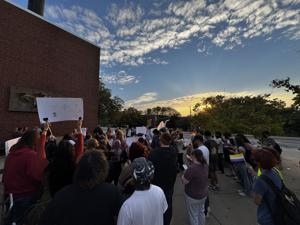
- LGBTQIA+ organizations hold Day of Trans Resilience at Milner PlazaCampus and Bloomington-Normal organizations in support of LGBTQIA+ rights brought forth their full support for transgender and queer students at Illinois State University with a Day of Trans Resilience. The Queer Coalition, PERIOD. at ISU, Central Illinois FRIENDS, the Prairie Pride Coalition and ISU Pride tabled from noon to 3:30 on Tuesday at Milner Plaza. At every table, informational pamphlets and freebies were offered to students passing by. One of the reasons surrounding the extra support was due to anti-trans activist Chloe Cole, who opposes gender-affirming care for minors following her own detransition, would be hosted by ISU’s College of Republicans in the evening. This event raised concerns among the student body on social media, prompting campus organizations to take action. Co-President of ISU’s Queer Coalition Brie Byers said that the organizations, specifically the Queer Coalition, wanted to pass a message to all trans and queer students that their campus supports them and wants to see everyone thrive. “We're out here throwing a resource fair, just showing [students] all the different resources that are available. Because honestly, it's kind of hard to see what resources are out there, so we're just putting it right out in front of them,” Byers said. Byers gave her input regarding the guest speaker who would arrive later that evening. “Just because transition wasn't for Chloe Cole doesn't mean that transition isn't a good choice for other people, and it doesn't mean that she gets to dictate whether or not other people should be able to,” Byers said. “If you want to talk about irreversible harm, go to all the trans people out there who have been denied trans health care and had to go through the wrong puberty in adolescence,” Byers continued. If a student is seeking a safe spot on campus with informative resources, Byers said the Multicultural Center at ISU is a good place to utilize. The Prairie Pride Coalition worked with the Queer Coalition to attend the event and provide additional resources throughout Bloomington-Normal for students on campus. Prairie Pride Coalition President David Bentlin said the foot traffic was a great way to share their organization’s side of the story. “[We are] presenting facts and resources, things that dispel the myths about gender identity and non-binaryism, so that's our purpose here today, and we're just glad to have the opportunity to meet with a lot of students, faculty and staff,” Bentlin said. The Prairie Pride Coalition provided pamphlets containing a variety of safe spaces across BloNo, along with an LGBTQIA-friendly business and resource directory. “We've got information on other organizations in the community that cater to specific populations within our community, like transgender social groups, transgender support groups, we have a number of other groups,” Bentlin said. “Our purpose here today is to share all that information with the community here on campus … a lot of times [students] are new and they're not familiar with the area of Bloomington-Normal,” Bentlin continued. Throughout the day, students in support of transgender visibility stood outside playing music and writing supportive messages with chalk on the campus’ Quad. Sophomore new media composition major Star Hall shared a reminder to all students on campus. “Be yourself and support the people who want to be who they are, that’s a great thing,” Hall said.
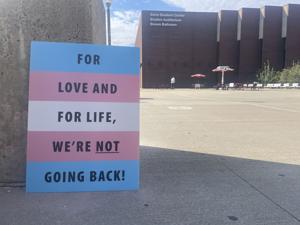
- Campus community rallies in the fight against sexual violenceStudents gathered Thursday, Oct. 9, at the Center for the Visual Arts to learn about the history of the annual Take Back the Night event and march for a safe campus environment. The event began at 5:30 p.m. with a presentation detailing the history of Take Back the Night. The marches first gained traction in the 1970s as violence against women began to rise. The Women’s, Gender and Sexuality Studies Program and Students Ending Rape Culture (SERC) hosted the event, providing materials for attendees to create posters for the march. SERC President Lauren Bounds led the presentation as attendees received pamphlets and pins for the night. “I want this to affect people in the way they need it to. I want everyone to feel individually seen and understood,” Bounds said. Bounds explained how the march takes a specific route, marching in front of local bars and fraternity houses to highlight locations where students may have safety concerns. Bounds said the route was a statement to the town and university to demand safe conditions for all. One of the most prominent stories relayed at the event was the case of Carol Rofstad, a student who attended Illinois State University in 1975 and was found deceased on the front lawn of the Delta Zeta Sorority after being assaulted by an unknown suspect. The story and remembrance of Rofstad stayed strong throughout the night as students marched for justice for her and other victims. Sophomore criminal justice major Melanie Sanchez attended the march to spread awareness for victims. Sanchez said the importance of the event was profound, as society views these matters as taboo and wishes not to discuss them. Sanchez noted that the voices of the united attendees would help spread awareness for others and relay the message of unity and power. Public health graduate student Caitlin Rosendorn emphasized the importance of the event. “This night is dedicated to you, feeling safe and taking back the night once and for all,” Rosendorn said. The march ended with a vigil service dedicated to survivors at the McLean County Young Women's Christian Association (YWCA).

- ISU prepares to 'Raise the Banner' for this year's Homecoming eventsFrom Oct. 13-19, Illinois State University’s annual Homecoming will take place. This year’s theme is “Raise the Banner.” ISU will welcome all students, alumni and family to partake in events throughout the week. Monday, Oct. 13 The Homecoming Kickoff and Tree Lighting Ceremony will take place from 6-7:30 p.m. at the Uptown Circle. Redbirds can join ISU President Aondover Tarhule and Normal Mayor Chris Koos in lighting the trees with white and red lights. The first 500 students to show their ISU student ID will receive a free homecoming t-shirt. Giveaways, games and entertainment will also be available. Tuesday, Oct. 14 An appreciation luncheon for ISU faculty, administrative and professional staff, along with civil service employees, will take place at 11:30 a.m. in the Brown Ballroom of the Bone Student Center. Faculty and staff must show their ISU ID upon entry. In the evening, registered student organizations can participate in a friendly competition at the annual Redbird Rumble. The games will take place from 7-9 p.m. at Hancock Stadium. Wednesday, Oct. 15 Students can join April Anderson-Zorn, ISU’s archivist, from noon to 1 p.m. to take a look at historic Redbird pennants as a part of the current exhibition at Milner Library. Attendees can register to join virtually. Thursday, Oct. 16 Students can give back at the Redbirds Care Homecoming Blood Drive from 11 a.m. to 3 p.m. in the Circus Room of the Bone Student Center. Registration can be done online. Hats off to Homecoming will take place from 11 a.m. to 1 p.m. in the Brown Ballroom of the Bone Student Center. Food will be available, as well as several activity stations. Attendees can make their own ISU trucker hat and play a full nine-hole mini-golf course. A game day button station, a photobooth and more will be at the event. Friday, Oct. 17 Cheer on ISU’s volleyball team at their white-out game. The game will begin at 6 p.m. and admission is $5 for all fans. Saturday, Oct. 18 The Hybrid Town and Gown 5K/1-Mile Fun Run/Walk will begin at 8 a.m. at the Student Fitness Center on campus. The annual Homecoming parade will begin at 10 a.m., starting at the corner of College Avenue and University Street. The parade can also be viewed online. From 11 a.m. to 2 p.m. at the Horton Field House, attendees can enjoy free food and giveaways at Redbird Village. ISU’s football team will take on Youngstown State University at 2 p.m. at Hancock Stadium. Tickets can be purchased online. ISU’s volleyball team will take on Southern Illinois University at 7 p.m. at CEFCU Arena. Tickets are available online. More information can be found here.

- COM Week returns to ISU's School of CommunicationIllinois State University’s School of Communication is bringing back COM Week for the first time since 2023. ISU’s communication majors can attend various events with guest speakers and activities throughout the week. Tuesday, Oct. 14 “Advertising and Marketing Content” from 11 a.m. to 12:15 p.m. in the State Farm Hall of Business Room 147. “AI and the Future of Communication” from 12:35-1:50 p.m. in Fell Hall Room 162. “Event Planning: From the Personal to the Powerful” from 3:35-4:50 p.m. in Fell Hall Room 280. “Why Local Journalism Matters: It’s More Than a Newscast” from 5-6:15 p.m. in Fell Hall Room 280. Pizza night for the School of Communication’s registered student organizations from 6:30-8 p.m. in Fell Hall Room 148. Wednesday, Oct. 15 “Leadership Communication” from 11 a.m. to noon in Fell Hall Room 152. “Connection as a Strategy: Embracing Culture and Community in the Chaos” from noon to 1 p.m. in Fell Hall Room 280. “Understanding the Challenges of AI in College” from 1-2 p.m. in Fell Hall Room 280. “In-Town Rivalry: University Athletic Communication (IWU vs. ISU)” from 2-3:15 p.m. in Moulton Hall Room 210. Thursday, Oct. 16 “Building a Career in Media and Advertising” from 9:35-10:50 a.m. in State Farm Hall of Business Room 145. “Inside and Outside the Storm: Institution and Agency Perspectives on Crisis Communication” from 11 a.m. to 12:15 p.m. in Fell Hall Room 446. “Young Alums of COM–Mass Media, PR, Journalism and Grad” from 12:35-1:50 p.m. in Fell Hall Room 162. “AI in Journalism” from 2-3:15 p.m. in Schroeder Hall Room 214. “Agency vs. Corporate vs. Institutional: A PR Showdown” from 3:35-4:50 p.m. in Schroeder Hall Room 244. Friday, Oct. 17 “Sports Communication Spotlight Panel with Honored Alums” from 3-4 p.m. in Fell Hall Room 280. “Sports Communication Roll-Out Reception” from 4-5 p.m. in Fell Hall Room 280 and the Atrium. Saturday, Oct. 18 “Hoss Homecoming Tailgate” from 11 a.m. to 2 p.m. in lot G83 behind Hancock Stadium. Additional information can be found here.

- Normal Theater brings global voices to the screen with the Manhattan Short Film FestivalFrom Sept. 25 to Sept. 28, the Normal Theater did an exclusive showing of the 28th Annual Manhattan Short Film Festival. Capping in at 20 minutes, films of different genres were entered throughout the beginning of the year to be picked for one of the 10 movies shown at over 500 theaters worldwide. For the past 19 years, the Normal Theater has showcased these films to viewers. From Hans Buyse’s film “Zodiac,” a story of two friends finding refugees drowning at sea, to Mikey Altoft’s “I Have My Reasons,” centered around 9-year-old Amanda grappling with a traumatic situation and how it shapes her life, the films differ dramatically. Senior film and philosophy major Madeline Russell works at Normal Theater and discussed the process of showing the films. “Manhattan Film Festival is a worldwide festival, " Russell said. “They (judges) take their submission, and then the board, which has people from all around the world, chooses the ones that get sent to the theaters. Then, those are the ones we show. And then for the four days, people come in, watch the films and then vote, and we take all the votes. We count them, and then send it out to the director of the festival.” There were two sheets of paper given out. One was a brief synopsis of the 10 films shown, and the other was a voting sheet where participants picked their favorite film and actor. After an introduction of what the Manhattan Short Film Festival was, viewers sat down and enjoyed the first five films, had a brief intermission and then finished with the last five films. The votes were then submitted to the festival organization and tallied together. The winners of the festival, announced on Oct. 6, were “We Have Sinned Before You,” directed by Ifat Nener Orgad for best film and Henrianne Jansen in “Of Beyond Silence,” directed by Marnie Blok for best actor. For more information on the film festival, click here.

- Emergency Management hosts fifth annual Night WalkAs Tuesday’s dreary skies cleared and the wind reduced to a breeze, over 30 students and administrators met at 6:45 p.m. in front of Hovey Hall to commence the fifth annual Night Walk. This walk commemorated Illinois State University professor Adam Peck, who passed away in 2022 due to a collision with a bicyclist on campus. “Adam was a huge advocate for all kinds of campus safety initiatives across this campus. Being able to bring student voices together to talk about any concerns that they have, and ways that we can address [those], is really exciting,” Emergency Management Coordinator Dan Simon said. A few brief introductions from speakers included Vice President of Student Affairs Levester Johnson, ISU’s Director of Emergency Management Eric Hodges and ISU Chief of Police Aaron Woodruff. The theme of this year’s walk centered on the fast-build projects installed to increase pedestrian safety on campus. The walk consisted of five stops where guest speakers, like ISU Environmental Health and Safety Director Adam McCrary, discussed the importance of the projects and how they would extend or dissipate depending on the feedback they would continue to receive until December. “So we're going to be soliciting feedback for the next few months. As people interact with these quick-build projects, they can continue to give feedback. We've heard mixed reviews in some of our different locations,” McCrary said. “One of the most popular ones, which actually isn't on campus, is the Broadway and Beaufort four-way. They're gonna keep that [while] still getting feedback on them, so we're still trying to figure out where all this is gonna land,” McCrary continued. Woodruff felt the event was a great way to engage and learn about safety concerns within the community. Additionally, he said the walk was an opportunity to receive feedback from students. “I hope they get to see that they have a voice, and if they have concerns, they get a chance to voice them. We've got a lot of partners, both with the town and the university here, that can help [while] addressing some of those concerns,” Woodruff said. Multiple students attended the event along with members from the Student Government Association. As an off-campus senator, Miguel Figueroa has a responsibility to oversee the safety of those on campus. Figueroa enjoyed the walk because it gave him the opportunity to identify areas that may lack in security and suggest ways to improve them. “I like that a lot of staff members, representatives from the town, our emergency management team, the police department and other student organizations are here. It's good to see the people who represent the students are here to see why the students need this or how they could better serve their constituents,” Figueroa said. Senior cybersecurity and economics major Abhijith Jannu and sophomore political science major Jamel Campbell attended the walk. After hearing about the event through their adviser, Assistant Vice President and Dean of Students Andy Morgan. “A lot of information is very vital not just [for] the leaders on campus, but also for students to know. For example, the crosswalks near Watterson and the one by CVS, right? That one, the four-way stop, I did not know that [it] was related to what we were doing here,” Jannu said. “I completely agree. It was something that I didn't really pick up on at first, and then I discovered that they were doing all these little projects. And I'm like, ‘Oh, they're doing it for us and for me,’” Campbell said. “I'm very big on campus safety. Being out here, being able to see exactly how the campus and ISU are keeping our students safe, is what means the most to me,” Campbell continued.
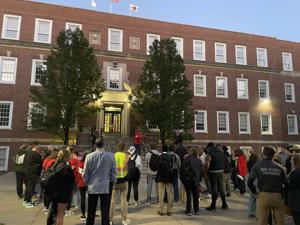
- SJP shows 'The Time That Remains' for Week of RageOn Wednesday, for the third day of the Week of Rage, Illinois State University’s Students for Justice in Palestine (SJP) held a movie night, showing Elia Suleiman’s “The Time That Remains.” “The Time That Remains” is a semi-biographical film following a family from 1948 to recent times. Suleiman balances drama and comedy to show a realistic point of view of Palestinians living through the creation of the state of Israel and the Nakba. March, a senior education major and SJP’s outreach and organization chair, discussed the importance of this movie. “When [people] are living through a disaster, they’re not solemn all the time. This feels very real, very human,” March said. The movie begins with the Israeli army taking over the city of Nazareth, followed by a string of violence that continues throughout the rest of the movie. The film balances war and daily life in a way that tries to make something foreign to most people easier to understand. March said this film shows how violence can impact everyone around the globe, and separating the current war from people’s lives is impossible. “Violence is not isolated, not selective; it hits every generation and every person,” March said. Alongside the violence in the film, the viewers also see the events leading up to the Palestinians no longer being tolerated, showing both mental and physical punishment. Despite its strong image, this showing was a chance for students to take a break while still learning and showing support. “This is an opportunity to connect with the artistic side of Palestinian people,” March said. This film has won five awards and had seven nominations in many film festivals, such as the Cannes Film Festival and the Cinema for Peace Awards. Showing an artistic film gave students the chance to see Palestinians in a way that some people have not seen them in recent years. March emphasized the ways Palestinians have been viewed differently. “How much land has been destroyed, how many people have died,” March said. “While really important, it can be dehumanizing to be reduced to data.” SJP hoped students used this opportunity to connect with humanity and realize that these are real people who are impacted. They also seek to foster a connection between students by using Rage Week and screening “The Time That Remains” as a catalyst. “When [students] are with other people, they recognize that this is a commitment,” March said. “It’s a necessary thing that needs dedication.” The film ended emotionally as the audience realized Elia Suleiman, who acted in his film, is playing himself. After the movie ended, students connected and had discussions to end the night. “Any kind of action that we can do is important,” March said. Showing “The Time That Remains” is another step SJP took in informing students of the past and present. SJP’s Week of Rage hopes to bring awareness to current events and continue its steps towards resolution.
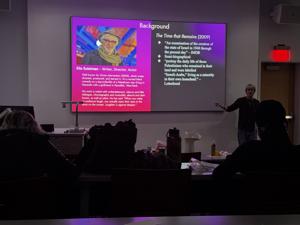
- Fall Internship and Career Fair introduces students to employersCareer Services hosted the Fall Internship and Career Fair at 2 p.m. Tuesday in the Brown Ballroom and Circus Room of the Bone Student Center. The fair included a range of employers, such as the city of OSF Healthcare and the Office of the Speaker of the Illinois House of Representatives. Career Services also offered free headshots to attendees. Professional recruiter for OSF Healthcare, Kristin Dozard, discussed what she is looking for in students applying for internships and jobs. “[I am] definitely looking for students with a background not only in healthcare, but [also in] business,” Dozard said. “We have other areas as well for behavioral health, social work, dieticians and areas like that.” HR Generalist at CEFCU, Zach Nelson, gave advice to students attending the fair. “It’s always worth getting that experience talking with employers, and maybe they can eventually give feedback, whether it’s performance feedback or feedback [regarding] communication with them. It’s always good [for students] to just put [themselves] out there and learn,” Nelson said. Sophomore engineering technologies major Jermaine Henry shared what he was hoping to get out of the fair. “Hopefully, I can secure [an internship] or go through the process of trying to find an internship. That’s my main goal coming today,” Henry said. Junior data science major Lily Frobish had similar goals. “Mainly, I’m just getting a look at all the employers that are here. I’m hoping to have a summer internship. I was fortunate enough to have one last summer, and this summer I’m hoping to do the same thing so I’m more prepared post-graduation,” Frobish said. Frobish discussed which employers she is most excited to talk to. “I’m involved in data science. There are billions of different companies in all different industries that work with data and analysis, so commonly you see this mostly in insurance,” Frobish said. “I’ve already done an internship in insurance, so I’m looking for companies in a different industry to get a bigger picture of what I can do in this field.” Junior creative technologies major Maddy Adams also shared which employers she wanted to talk to. “Honestly, I’m just kind of looking around, hoping my major has something related to one of the [companies] here,” Adams said. Career Services is hosting an Education Career Fair from 10 a.m. to 1 p.m. Oct. 21 in the Horton Field House. Similar events can be found on Redbird Life.
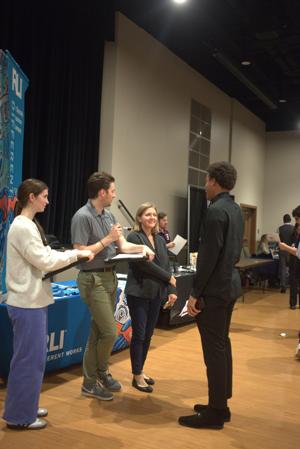
- SGA appoints secretary of elections, passes first two bills of the semesterIllinois State University’s Student Government Association (SGA) held its first meeting of October and appointed Matt Saner to the position of secretary of elections. Saner is a sophomore majoring in cybersecurity and the vice president of Turning Point USA (TPUSA). “I run the TPUSA chapter at ISU, which is a nonpartisan organization that promotes American values … through my organization, I was able to impact a lot of people’s voting habits,” Saner said. “I also am always out tabling throughout the week … I know voter student outreach is a big thing for SGA, so I am always ready to go out and talk to students [and] talk to the voters about pretty much any issue,” Saner continued. While TPUSA is a nonpartisan organization, it is intimately tied to conservative activism, especially among young adults. Saner’s affiliation with the organization prompted some questions during the debate session. Off-Campus Senator Matthew Rickey opened the debate with a reminder of SGA’s values. “As in the bylaws of last year, we are a nonpartisan association … so we only deal with issues relating to students,” Rickey said. Rickey supported Saner’s appointment. “We met with Matt during internal affairs,” Rickey said. “He spoke very professionally, detailed all of his experiences in organizations and in leadership committees, and as the previous secretary of elections, I do believe he has the skills needed for this particular position.” Student Life Senator Braden Beasley also advocated for Saner. “He’s never once, despite obviously being a part of Turning Point, shown me that he would allow that to impact his running [of] the election … he’s very by the book,” Beasley said. “I’ve seen him go from somebody who had no experience to where he is now, and I can confidently say that he would be an incredible pick for the position,” Beasley continued. However, some questioned his appointment due to his political associations. Tri-Towers Senator Hassan Hillard was one such student, “Since he’s the vice president of Turning Point, doesn’t that make it an ultimate conflict of interest, no matter what?” Speaker of the Assembly Emma Susami addressed the question. “Members of our student body are members of Turning Point, so just because he is so closely tied to a specific political organization does not mean that he’s going to bring that here,” Susami said. Student Body President Noah Montoya was in favor of Saner’s appointment. “I have already conversed with him several times,” Montoya said. “Every conversation has built up to me believing he’s the right pick for the secretary of elections.” Dean of Students and SGA Advisor Andy Morgan discussed his responsibility in ensuring that the secretary of elections stays within the guidelines. “I meet with the secretary of elections probably every other week, all the way until March, and so I make sure that the secretary of elections [is] following the election code that [SGA] approves,” Morgan said. “So, there are some guardrails there … if I have any concerns, I will bring it up to the executive board,” Morgan continued. Saner was ultimately elected. 12 voted yes, five voted no and 10 abstained. Abstention did not count toward the final tally, so Saner was appointed. SGA also passed its first two bills of the year unanimously. They allocated $1000 for the School Street Food Pantry to support the purchase of reusable bags, and $250 to Students Ending Rape Culture, which allows them to purchase roughly 555 drink testing strips and 50 reusable cup covers. The next SGA meeting will take place at 7 p.m. Wednesday, Oct. 15, in the Student Services Building, Room 130.
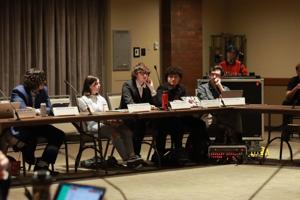
- Protesters march through ISU and Uptown in support of PalestineAt 6:30 p.m. on Tuesday evening, more than 40 students and community protesters gathered in the Uptown Circle in Normal to protest the ongoing conflict happening in Palestine. As the Students for Justice in Palestine (SJP) holds “Rage Week,” a week dedicated to spreading awareness and hosting informational events about the ongoing attacks that have been oppressing the people of Palestine, they held a march through the streets of Uptown. Protesters stood in the circle displaying cardboard signs and waving Palestinian flags, while socializing with their fellow peers. Shortly after 6:45 p.m., the group was given pamphlets with chants and took to the streets of Normal. While marching and chanting, bystanders observed the protest. They gave shouts of approval, and some joined the march after observing. The protesters moved across the Illinois State University Quad and ended at the Quad’s gazebo. Student representatives gave speeches regarding the issue before the crowd dispersed. Students who look to join SJP for future events can follow them on Instagram, or join their in-person meetings at 7 p.m. each Monday evening in Schroeder Hall. For more information about SJP's "Week of Rage" events, check their itinerary here.
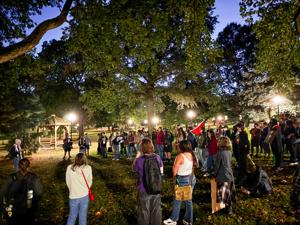
- ISU student groups host a food drive for local residentsAt Illinois State University, a small box is playing a big role in supporting underprivileged residents in the community. The Young Democratic Socialists of America (YDSA), Punks Against Trump and Food Not Bombs Blo-No joined forces to host a food drive. YDSA Public Relations Chair Oliver Alvarez-Miller said the initiative focused on distributing food to underprivileged communities in the Normal and Bloomington area. “This initiative is an effort for food to be distributed to low-income, homeless and other individuals who do not have access to these foods,” Alvarez-Miller said. Punks Against Trump has done at least two food drives so far, contributing their time and effort to the community. “We did this again because we think it's a valuable use of community time and effort to unite under the common cause of feeding people,” an anonymous Punks Against Trump member said. “All the food received during this drive will go directly to our partners at Food Not Bombs, where it will be prepared and distributed to those in need.” YDSA has weekly meetings on Tuesdays from 6-7 p.m. The food drive ran until Sept. 26.

- Car catches fire in the middle of the street on campusA car caught fire Monday afternoon in the middle of South Fell Avenue on Illinois State University's campus. The Normal fire and police department reached the car quickly and extinguished the flames. Although the individual's name and cause of the fire have not been released, authorities are still investigating the scene. Arson investigators were additionally at the scene investigating the incident. This story will be updated.
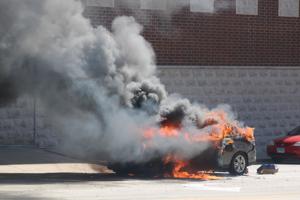
- ISU's NACWC spreads awareness about gun violence, honors sister during Walk For PrestonThe Women of Enlightenment Chapter of the National Association of Colored Women’s Clubs (NACWC) at Illinois State University brought the community together during the Walk For Preston. The walk took place from 11:30 a.m. to 1:30 p.m. Oct. 4 on the Quad. On May 6, 2023, NACWC lost their sister, Aréanah Preston, to gun violence. This walk was organized to spread awareness about gun violence and push for change. Junior elementary education major Kiara Shields is the vice president of the Women of Enlightenment Chapter. She was one of the people who helped organize the walk. “We began this walk last year for the first time in honor of one of our fallen feds, Aréanah Preston,” Shields said. “She was a Chicago police officer that was killed right when she got off duty by gun violence.” Junior political science major Lexi Smith is the president of the Women of Enlightenment Chapter and another organizer of Walk For Preston. Smith explained the inspiration behind organizing this walk. “We initially got the idea from Nigeria Figures, who’s a previous member of our organization,” Smith said. “She brought up the fact that we should do something to give back to the community of ISU, and we took initiative and did that.” Leaders gave opening remarks at 11:50 a.m., followed by a prayer led by junior Bella Green. The walk, led by Preston’s family, began immediately afterwards. Attendees received a punch card to keep track of how many laps they walked around the Quad. Those who walked six laps had a chance to enter a raffle to win select prizes. Organizers and attendees also used chalk to write motivational words on the Quad. Smith’s favorite motivational quote was “Remember your why,” explaining that she believes “everyone is here for the same purpose.” Smith continued to explain the purpose behind the walk. “A lot of us are motivated by Aréanah Preston, our sister, but we’re also walking for those who can’t as well—those who passed away through gun violence,” Smith said. Preston’s mother, Dionne Mhoon, described the kind of person Preston was. “She was amazing, very well organized, funny, goal-driven, excited about her next goals and very much a blessing to have,” Mhoon said. “I am so proud of her. Even though she was not able to complete all [of] her goals, I’m proud to call her my daughter.” Mhoon described how she wants others to remember Preston. “I want [everyone] to remember her greatness, what a great person she was and how she gave so much in the little time that she was here,” Mhoon said. “[She] could set goals and finish them and still be a well-rounded child.” Preston’s family created the private, nonprofit Peace For Preston Foundation to continue her work and honor her life by giving back to others. “We do food giveaways, prom dress giveaways, we go to [Chicago Public Schools] and mentor,” Mhoon said. “[We’re] just trying to teach kids how to do the right thing, to make great choices and how bad choices will affect so many lives.” The walk ended at around 1:30 p.m. with a closing prayer led by junior integrated health major and NACWC Community Service Chair Stephanie Akindipe. Shields explained why it is important to raise awareness about gun violence. “Just knowing that a lot of the population of [ISU] comes from Chicago, and gun violence is a prevalent issue within the community [of Chicago],” Shields said. “We just wanted to shine a light on that, and then we also wanted to honor the legacy of one of our sisters and all that she has done for the organization and community as a whole,” Shields continued. Mhoon shared what she hopes the community takes away from this walk. “Put the guns down and make great choices,” Mhoon said. “The choices you make can affect so many. The bad choices can leave such a negative impact on so many families.” “This is [the] second year of her passing, and it feels like the very first day, most days,” Mhoon continued. “But, I get up for her. I know that her work is not complete, so I have to finish that work. It’s important to keep fighting, even through my grief.” More information about the Peace For Preston Foundation can be found here.
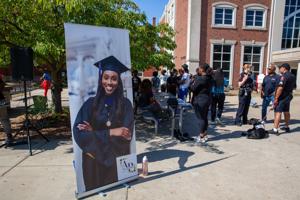
- Redbird Powerlifting to host Iron Will Charity ClashRedbird Powerlifting is hosting the Iron Will Charity Clash at 9 a.m. Saturday, Oct. 18, at Gonzo’s Barbell in Normal. The event will consist of a powerlifting meet aimed to raise money and awareness for veteran mental health and suicide. Men and women are invited to compete for awards and raise awareness for their organization. Spectators and competitors will both have to pay for entry. Over 70% of the proceeds will be donated to Operation Obstacle 2025, an organization partnered with Richland Community College to help raise funds and awareness for veteran mental health and suicide. More information about the event can be found here.

- Students for Justice in Palestine to host second Week of RageStudents for Justice in Palestine (SJP) at Illinois State University are calling for the entire campus to join the second Week of Rage, taking place this Monday through Friday. As the conflict between Palestine and Israel has been ongoing for two years, on Oct. 7, the death toll has risen over 67,000. ISU’s SJP members will partake in a variety of week-long resistance against the conflict and encourage students to attend each one. The first event takes place from 8 a.m. to noon Monday and Thursday at Milner Plaza. The event consists of SJP launching their “Boycott the Bone” campaign, as they will target Starbucks as a source of income for ISU. At 6:30 p.m. Tuesday evening at the Uptown Circle, a “Resistance is Justified Rally” will take place. More details regarding the event are said to be released soon. A cultural and educational screening of “The Time That Remains,” a story that follows a Palestinian boy as he navigates life during and after the 1948 Nakba, will take place at 6:30 p.m. Wednesday in Room 145 of the CVA. The final event will begin at 2 p.m. Friday at the Quad’s gazebo. SJP will host a vigil and poetry reading taking place from 2-3, followed by a community potluck beginning at 4:30 p.m. at Underwood Park. For more details regarding the Week of Rage schedule, read here.
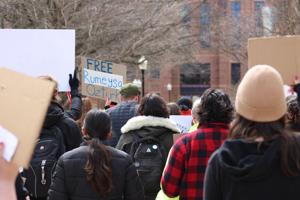
- Students brush the stress away at SAC's Paint and SipIn the midst of midterms, Illinois State University’s Student Alumni Council (SAC) hosted a paint and sip event Thursday for students to unwind. Painting is known to bring a sense of relief and help destress. SAC brought in ISU alumnus Joe McGuire to teach students the art of painting. McGuire helped students create their own masterpiece while they sipped on mocktails with their friends. “I wanted them to be able to escape for a couple of hours,” McGuire said. “It’s tough being a student. We want them to relax.” Junior publishing studies major Dakota Heatley was able to destress at the event. “I do find painting very relaxing,” Heatley said. “Not everything has to be serious. The people around me were having so much fun.” Freshman integrated marketing and communication major Martha Otero believes events like this can be beneficial for self-care. “I feel like [self-care] is something that a lot of us don’t do,” Otero said. Students pointed out that SAC providing the supplies made the event more worthwhile. “I do like that everything was provided,” Heatley said. “It makes it more accessible for students who may not have the supplies.” Otero discussed what factors made the event more enjoyable. “Having friends here just made it more fun,” Otero said. “It’s nice being able to laugh and joke around while painting.” Students were not the only ones who enjoyed themselves. McGuire shared that the students' energy influenced the atmosphere of the event. “[Painting] is really easy for students to pick up and get excited about,” McGuire said. “We just launched into action and had fun.” McGuire said students getting involved in ISU events is a very important step in creating lifelong relationships. “[Getting students] tied into events and things that the university is doing is going to help connect them to alumni, hopefully for many years to come,” McGuire said. Students and McGuire mentioned the influence of painter Bob Ross on their artistic abilities and paintings. Heatley recalls watching Ross’s videos in order to get inspiration. “It made me think about first learning how to paint trees, [and how] certain things should be done,” Heatley said. Despite some students not having the same abilities as Bob Ross, many left proudly with their painting in hand. This year marks the third consecutive fall that SAC and McGuire hosted a paint event. The success of each one has brought up the idea of hosting more in the near future.
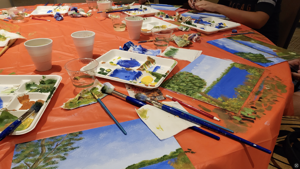
- Accounting Career Fair connects students with top employersIllinois State University Career Services hosted its annual Accounting Career Fair at the Bone Student Center. The 2025 Accounting Career Fair kicked off at 1 p.m. on Sept. 19 and featured over 30 employers recruiting students for in-person or hybrid internships and part-time positions. Employers ranged from Cherry Bekaert Accounting to Caterpillar Manufacturing. Events Coordinator for Employer Engagement and Career Services, Rachel Janicki, encouraged students in the accounting field to attend the event to gain experience in interviewing and networking with professionals in the industry. “We have some state organizations, we have private companies and we have our engagement partners such as ADM Country Financial and Enterprise,” Janicki said. Other employers who made appearances at the event included State Farm, Growmark Inc., Kemper CPA Group and the Illinois Department of Revenue. Sophomore Sarah Mae attended the fair in hopes of gaining networking opportunities and interviewing with possible employers for available positions. “I think today has been very successful. There are many firms here and a wonderful student turnout,” Mae said. Janicki shared her excitement for future career fairs, such as education and health services career fairs and other general events for undecided majors.
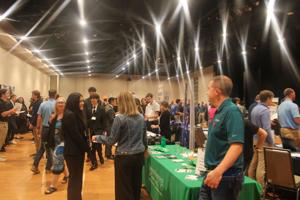
Load more...
Loading...


